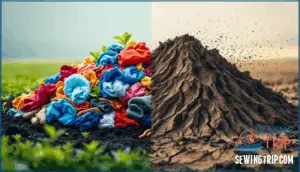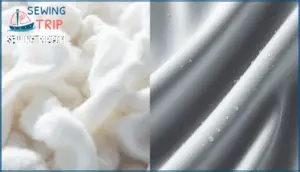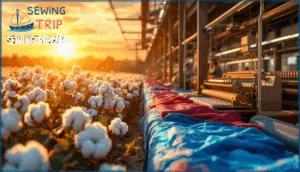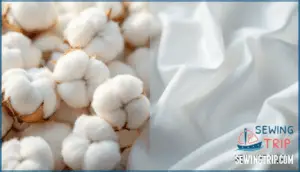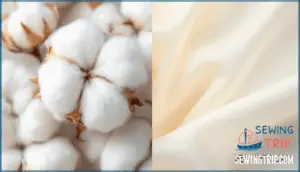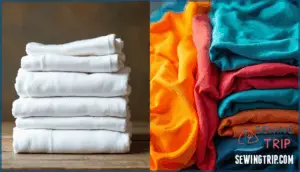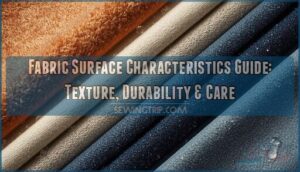This site is supported by our readers. We may earn a commission, at no cost to you, if you purchase through links.
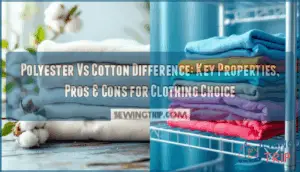 Every closet holds a quiet contest between cotton and polyester. You reach for a shirt, maybe thinking about comfort on a humid afternoon or how well it’ll survive a spin in the dryer.
Every closet holds a quiet contest between cotton and polyester. You reach for a shirt, maybe thinking about comfort on a humid afternoon or how well it’ll survive a spin in the dryer.
These two fabrics aren’t just fibers—they’re the backbone of daily wear, each with strengths and quirks that shape how clothes feel, last, and impact the planet.
Understanding the polyester vs cotton difference can help you choose what suits your skin, your lifestyle, and even your values. Whether you’re planning a project or updating your wardrobe, knowing these details puts you in control.
Table Of Contents
- Key Takeaways
- Cotton Vs Polyester Properties
- How is Cotton Processed?
- What is Polyester Made Of?
- Polyester Vs Cotton: Pros and Cons
- What’s The Difference Between Cotton and Polyester?
- Which is Better for Clothing Design: Polyester or Cotton?
- Starting Your Cotton or Polyester Project
- Frequently Asked Questions (FAQs)
- Conclusion
Key Takeaways
- Cotton excels in comfort, breathability, and skin sensitivity, while polyester stands out for durability, moisture-wicking, and affordability.
- Polyester’s synthetic fibers offer longer lifespan and quick-dry performance, but come with higher environmental impacts like microplastic pollution.
- Cotton is biodegradable and hypoallergenic, though its production uses more water and typically costs more than polyester.
- Blends like 50/50 cotton-polyester combine strengths from both fabrics, offering balanced comfort, durability, and easy care for everyday wear.
Cotton Vs Polyester Properties
When you’re choosing between cotton and polyester, it’s smart to look at what sets them apart. Each fabric brings its own strengths and weaknesses to the table.
Let’s break down the main properties that matter most for your clothing needs.
Absorbency

When you’re picking out a shirt for a steamy day or a tough workout, absorbency is the fabric feature that can make all the difference. Cotton’s natural fibers excel at moisture absorption and sweat management, soaking up liquid and keeping you comfortable. Polyester, on the other hand, is hydrophobic, repelling water and relying on moisture-wicking to move sweat away. This impacts drying time and overall comfort. If you care about moisture retention and breathability, cotton is the clear winner.
Here’s a quick look:
| Feature | Cotton |
|---|---|
| Moisture Retention | Excellent |
| Liquid Absorption | High |
| Drying Time | Slow |
| Sweat Management | Excellent |
| Fabric Weight | Heavier |
Strength
After looking at absorbency, let’s talk about how these fabrics fare when life puts them to the test. Polyester has the edge in tensile strength and abrasion resistance, making it a top pick for durability and wearability. Cotton’s fiber strength improves when wet, but it’s still more prone to wear and tear. If you’re thinking about longevity, polyester’s tear resistance and blend strengths outlast cotton every time.
Here’s a quick durability comparison:
| Factor | Cotton | Polyester |
|---|---|---|
| Tensile Strength | Moderate | High |
| Abrasion Resist. | Lower | Excellent |
| Tear Resistance | Fair | Excellent |
| Longevity | Shorter | Longer |
Sustainability
Let’s shift gears from strength to sustainability—a topic that’s shaping the way you choose fabrics. Cotton stands out for its biodegradability, but its water usage and carbon footprint are hard to ignore. Polyester’s durability comes with a heavy environmental impact, especially microplastic pollution and slow decomposition. If ecofriendly options matter to you, organic cotton and recycled polyester offer sustainable alternatives. One benefit of using recycled polyester is that it helps in reducing plastic waste.
Here’s a quick look:
| Material | Biodegradable | Ecofriendly |
|---|---|---|
| Organic Cotton | Yes | Yes |
| Recycled Polyester | No | Yes |
Comfort
When you’re weighing sustainability, it’s just as important to think about how cotton and polyester actually feel against your skin. Cotton gives you a gentle, breathable experience—ideal for those with skin sensitivity or who crave comfort in hot weather. Polyester offers a smoother tactile feel and moisture-wicking, but less breathability and thermal regulation. If you’re choosing for comfort, consider this quick comparison:
| Fabric | Breathability | Skin Sensitivity |
|---|---|---|
| Cotton | Excellent | High |
| Polyester | Moderate | Moderate |
How is Cotton Processed?
From the sun-drenched fields to the hum of factory looms, cotton’s transformation into fabric is a story woven with both tradition and technology. Cotton starts as a natural fiber, harvested for its purity and softness. The journey unfolds in five key steps:
- Cotton Ginning: Machines separate seeds from fibers, preserving the cotton’s composition and origin.
- Fiber Cleaning: Impurities are removed, guaranteeing the fiber’s quality and properties.
- Yarn Spinning: Fibers twist into strong, flexible yarn, ready for weaving.
- Fabric Weaving: Yarn is woven into breathable, durable cloth—a hallmark of natural fibers.
- Dyeing Process: Color and finish are added, tailoring the final look.
Every stage highlights the precision and care behind cotton’s manufacturing processes.
What is Polyester Made Of?
Ever wondered how polyester goes from raw oil and gas to the fabric in your workout gear? The answer lies in the polymerization process, where petroleum sources are refined into purified terephthalic acid and ethylene glycol. These chemicals combine to form a synthetic polymer, which is then melted and spun into synthetic fibers.
That’s the backbone of polyester composition and origin—engineered, not grown. Unlike cotton, which comes from plants, polyester’s chemical composition is rooted in petroleum products.
Production volume is massive, with polyester accounting for nearly 59% of global fiber output. So, when you wear polyester, you’re wrapped in a fabric born from modern industry and scientific innovation.
Polyester Vs Cotton: Pros and Cons
Choosing between polyester and cotton isn’t always straightforward, especially when you weigh their strengths and weaknesses. Each fabric brings its own set of benefits and drawbacks to the table. Let’s look at how they compare in a few key areas.
Durability
If you want clothing that stands up to life’s wear and tear, polyester’s durability is tough to beat. Thanks to high abrasion resistance and impressive tensile strength, polyester weaves rarely show fiber degradation. Cotton, while comfortable, can’t match polyester’s wear resistance or lifespan expectancy. For clarity, here’s how their fabric properties stack up:
| Property | Polyester | Cotton |
|---|---|---|
| Abrasion Resistance | Excellent | Moderate |
| Tensile Strength | High | Moderate |
| Fiber Degradation | Minimal | Noticeable |
| Lifespan Expectancy | Long | Shorter |
Allergies and Skin Sensitivity
Did you know your fabric choice could make or break your skin’s comfort? Polyester allergy symptoms—like itching and redness—often stem from skin sensitivity or reactions to textile chemicals. Cotton, on the other hand, boasts hypoallergenic properties and is consistently recommended for atopic skin, eczema, or allergies. Health considerations matter: cotton’s gentle weave soothes, while polyester can provoke irritation. Clinical trials have confirmed cotton’s non-irritating nature, even for sensitive skin. Even cotton dust asthma is a concern in industrial settings, but for daily wear, cotton’s soft embrace wins out.
| Fabric Type | Skin Sensitivity | Health Considerations |
|---|---|---|
| Cotton | Hypoallergenic | Rare irritation |
| Polyester | Irritant risk | Allergy symptoms |
| Cotton Dust | Asthma trigger | Occupational hazard |
Moisture Wicking
Picture yourself powering through a tough workout—would you rather your shirt feel like a sponge or a breeze? Polyester’s moisture-wicking properties pull sweat away, boosting drying speed and comfort levels. Cotton absorbs sweat, leaving you damp and prone to odor retention.
For temperature regulation and moisture and sweat management, polyester wins in breathability and quick-dry performance.
| Fabric | Moisture Management | Drying Speed |
|---|---|---|
| Polyester | moisture-wicking | Fast |
| Cotton | moisture absorption | Slow |
What’s The Difference Between Cotton and Polyester?
Choosing between cotton and polyester is like picking the right tool for the job—each has its own strengths. Cotton comes from a plant, making it biodegradable and soft, while polyester is a synthetic fiber, built for durability and quick drying.
Want to visualize the differences between cotton and polyester? Here’s how they stack up:
- Fiber Composition: Cotton is natural and cellulosic; polyester is synthetic and polymer-based.
- Production Volume: Polyester dominates global output, with 78 million tonnes in 2024, far surpassing cotton’s 24.1 million.
- Market Cost: Polyester stays budget-friendly, while cotton commands a premium for comfort.
- Environmental Impact: Cotton biodegrades, but polyester persists, contributing microplastics and higher carbon emissions.
Understanding these properties lets you choose wisely for any project.
Which is Better for Clothing Design: Polyester or Cotton?
Now that you know what sets cotton and polyester apart, let’s talk about which one actually works best when you’re designing clothes. Think about your design aesthetics, intended lifespan, and target audience.
Cotton’s comfort and feel make it ideal for everyday wear, especially if ethical sourcing matters to you. Polyester, on the other hand, stands out for durability and longevity, with fabric properties and performance that suit activewear and bold styles.
Cost implications play a big role too—polyester is often more affordable, while cotton signals premium quality. If you’re after moisture-wicking or wrinkle resistance, polyester wins. For breathability and softness, cotton takes the lead. The right choice depends on your priorities and the suitability for different uses.
Starting Your Cotton or Polyester Project
So, once you’ve settled on cotton or polyester for your design, it’s time to roll up your sleeves and get practical with your project plans. Your Project Fabric Choice shapes every step, from Budget Considerations to how your final piece looks and feels. Think about your Skill Level—cotton’s forgiving nature suits beginners, while polyester’s resilience favors more complex projects. Ask yourself: what’s the Intended Use? Everyday wear or outdoor gear? Consumer preferences matter too; some folks swear by the softness of cotton, while others want the easy care of polyester. Don’t forget to compare Fabric properties—how the material behaves under stress, moisture, and wear.
Here’s what to keep in mind:
- Match material to purpose
- Weigh Budget Considerations
- Factor in Project Complexity
- Test for color and texture
- Listen to consumer preferences
Choosing the Right Fabric means thinking ahead.
Frequently Asked Questions (FAQs)
Which is better cotton or polyester?
Imagine hiking in the rain—polyester keeps you dry, while cotton feels clammy. For fabric performance, polyester wins durability and moisture-wicking. Cotton excels in breathability and comfort.
Your best choice depends on activity, cost comparison, and user preference.
Is polyester healthier than cotton?
Cotton’s natural fibers offer enhanced breathability and comfort, reducing skin irritation and allergen retention.
Polyester’s synthetic makeup can trap heat and moisture, raising chemical exposure risks and long-term effects, especially for sensitive skin and hypoallergenic needs.
What are the disadvantages of polyester?
As the saying goes, "Not all that glitters is gold." Polyester’s breathability issues, static cling, low melting point, dyeing challenges, and environmental impact—especially its poor sustainability and lack of biodegradability—can leave you reconsidering its place in your wardrobe.
Polyester’s poor breathability, static, melting point, and sustainability issues make its lasting impact worth a second thought in your wardrobe
Is 50% polyester and 50% cotton better than 100% cotton?
A 50/50 Cotton-Polyester Blend strikes a balance—offering the comfort of cotton and the durability of polyester. This blend advantages everyday wear, reduces wrinkling, and is cost-effective.
It’s ideal for active use, but pure cotton excels in breathability.
What is the difference between polyester and cotton?
Polyester’s synthetic origins give it durability and moisture resistance, while cotton’s plant-based fiber offers softness and breathability.
Fiber composition, production volume, and market share shape their cost analysis, global impact, and fabric properties—each excels in distinct applications.
What is the difference between polyester and polycotton?
Polycotton combines polyester’s strength with cotton’s breathability, creating a balanced blend composition.
You’ll notice weave variations and performance differences, making polycotton ideal for activewear, uniforms, and bedding.
Cost analysis shows polycotton is often more affordable than pure cotton.
Why is cotton a water-intensive fabric compared to polyester?
Extensive cotton irrigation drives up its water footprint, with each T-shirt requiring thousands of liters. Polyester production uses far less water, making cotton’s environmental impact—especially regarding water pollution and sustainability—a major concern in textile manufacturing.
Is cotton more expensive than polyester?
Like a price tag that catches your eye in a crowded market, cotton often costs more than polyester. Market fluctuations, production costs, and consumer perception drive cotton’s higher retail pricing, making cost analysis essential for buyers.
What is the difference between cotton and polycotton?
When you compare polycotton with pure cotton, you’ll notice blend ratios and weave types make a big difference.
Polycotton fabric blends offer improved wrinkle resistance, cost analysis benefits, and performance differences, making them ideal for everyday wear and active use.
Why is cotton softer than polyester?
You’ll notice greater comfort and softness with cotton because its fiber structure is naturally plush and breathable. Lower surface friction, fewer chemical treatments, and weave impact all contribute to cotton’s perceived softness compared to polyester’s smoother texture.
Conclusion
Think of cotton and polyester as two paths winding through a fabric forest, each marked by its own terrain. Cotton feels like a well-trodden trail—soft, familiar, and gentle on your skin. Polyester is the engineered bridge, durable and built for unpredictable weather.
The polyester vs cotton difference isn’t just technical; it’s about choosing the route that matches your journey. Whether comfort or resilience matters more, your wardrobe becomes a map reflecting where you want to go.
- https://textile-yarn.com/blog/difference-between-polyester-and-cotton/
- https://textileexchange.org/knowledge-center/reports/materials-market-report-2025/
- https://www.selflessclothes.com/blog/polyester-fabric-sustainability/
- https://www.cottoninc.com/wp-content/uploads/2017/12/TRI-4007-The-Measurement-of-Cottons-Comfort.pdf
- https://pmc.ncbi.nlm.nih.gov/articles/PMC9051004/


